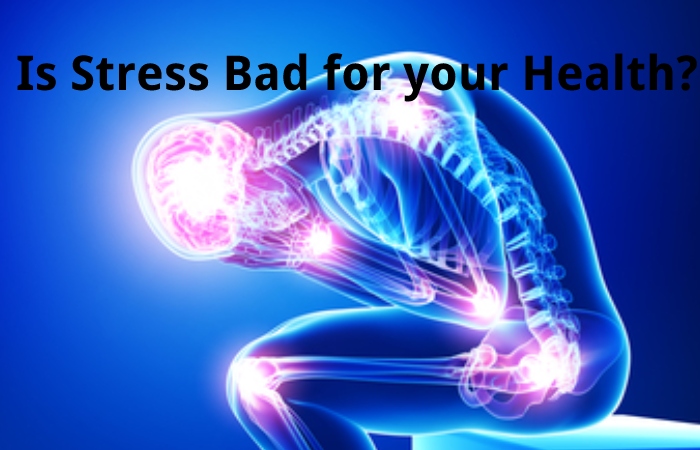Table of Contents
Stress Effects on the Body
Stress affects the body and is a natural feeling of not existence able to cope with specific stresses and events. However, anxiety can develop a chronic condition if steps are not taken to manage it. These demands can come from work, relations, financial pressures, and other situations, but anything that poses an actual or perceived challenge or threat to well-being can cause stress.
What is Stress?
Stress is the body’s natural defense against predators and danger. It causes the body to be flooded with hormones that prepare its systems to evade or face trouble. The body yields more substantial amounts of epinephrine, cortisol, and norepinephrine. These trigger the following physical reactions:
- Increased blood pressure
- great muscle preparation
- sweating
- state of alert.
Physical Effects of Stress Effects on the Body

Stress delays normal bodily functions, such as those of the digestive and immune systems. As a result, the body can focus on breathing, blood flow, alertness, and preparing muscles for unexpected use.
The body changes in the following ways during a stress reaction:
- blood pressure and pulse increase
- breathing quickens
- the digestive system slows down
- immune activity decreases
- muscles become tenser
- sleep decreases due to increased alertness.
How a person reacts to a problematic situation will determine the stress on their overall health. Some people can knowledge several stressors in a row, or at the same time, without causing a severe stress reaction. Others may have a more robust response to a single stressor.
Stress Effects on the Body
The National Institute of Mental Health (NIMH) recognizes two types of stress: first being acute and second chronic. These require different levels of control.
The NIMH also identifies three examples of types of stressors:
- routine stress, for instance, from caring for children, duties, or financial responsibilities
- unexpected and troublesome changes, such as the death of a relative or loss of a job
- Traumatic stress can occur due to extreme trauma due to a severe accident, assault, environmental disaster, or war.
1. Acute Stress
This type of stress is short-term and generally the most common form. However, acute stress often develops when a person considers the pressures of events that have occurred recently or faces challenges shortly.
For example, a person may feel harassed about a recent fight or an approaching deadline. However, the stress will lessen or go away once the person resolves the issue of the battle or meets the deadline.
2. Chronic Stress
This type of stress grows over a long period and is more damaging. Ongoing lack, a dysfunctional family, or an unhappy married are examples of situations that can cause chronic stress. It occurs when a person can’t find any way to avoid their stressors and stops looking for solutions. A traumatic experience early in life can also donate to chronic stress.
Chronic stress makes it problematic for the body to return to an average level of stress hormone activity, which can contribute to problems in the following systems:
- cardiovascular
- respiratory
- of the dream
- immune
- reproduction.
Causes of Stress Effects on the Body
People react differently to stressful circumstances. What is stressful for one being may not be stressful for another, and nearly any event can cause stress. Just thinking about one or several more minor triggers can cause anxiety for some people.
Every day major life events that can trigger stress include:
- problems at work or with retirement
- lack of time or money
- duel
- family problems
- illness
- move
- relationships, marriage and divorce
Symptoms and Complications
The physical effects of stress can include:
- sweating
- back or chest pain
- muscle spasms or spasms
- fainting
- Headaches
- nervous spasms.
Diagnosis of Stress Effects on the Body
The doctor usually diagnoses stress by asking the person about their symptoms and life events.
Diagnosis of stress can be difficult because it depends on many factors. Physicians have used questionnaires, biochemical measures, and physiological techniques to identify stress. However, they may not be objective or practical.
The most direct way to identify stress and its belongings on a person is through a comprehensive, in-person, stress-oriented interview.
Treatment of Stress Effects on the Body
Treatment includes self-help and certain medications when an underlying condition is causing stress. Therapies that can help a person relax include aromatherapy and reflexology.
Some insurance providers cover this type of action. However, verifying coverage with the provider before proceeding with this treatment is essential. In addition, knowing the details about possible therapies can help prevent it from adding to ongoing stress.
1. Medicines
Usually Doctors don’t prescribe medicines to manage stress unless they’re handling an causal medical ailment, such as depression or an anxiety disorder.
They may recommend an antidepressant. However, there is a risk that the medication only masks the stress rather than helping the person cope. Antidepressants can also have side effects and worsen pressure complications, such as low libido.
2. Control
Regular exercise can help control stress. In addition, people may find that the following lifestyle measures can help them manage or prevent feeling overwhelmed by stress.
Exercise: A 2018 systematic review of biological studies found that exercise can reduce memory decline in stressed subjects, although human studies are needed to confirm this.
Nutrition: A healthy, food balanced diet containing plenty of fruits and vegetables can help support the immune system during stress. An improper diet can lead to poor health and additional stress.
Priority management can help prioritize a daily to-do list and focus on urgent or due tasks. People can then focus on what they’ve completed or accomplished for the day rather than on tasks they haven’t finished.
Time: People must reserve time to organize their schedules, relax and follow their interests.
Is Stress Bad for your Health?

Some forms of short-term stress can be helpful. For example, maybe there’s a project that you’ve been putting off for weeks and needs to deliver. The pressure you suddenly feel to provide that project is stress. This type of stress is short-lived. However, it can boost your energy, focus, and adrenaline levels to deliver on time. Some people working well under pressure understand how to make the most of this short-term stress.
Tips for Managing the Impact of Stress on your Health
Once it can be managed, it is possible to reduce the impact of stress on health. Try these tips when you feel stressed:
Identify stressors: Acknowledge feelings of anxiety. What is bothering you? Is it the job, the money, a relationship, or something else? When you know this, you can begin managing stress healthily.
Discuss with the therapist or counsellor: Let them know what’s happening and how you feel. They would help identify the cause of the stress and offer supportive advice on achieving it.
Exercise and implement an active lifestyle: Being more active is one of the easiest and best ways to overcome stress. Mobile, biking, running, gardening, yoga, or lifting weights can change your focus and the hormones in your brain.
Meditate: Meditation can lower blood pressure and reduce anxiety and tension. 4 If you feel stressed, try a meditation or mindfulness method to help manage it.
Participate in fun activities: Find a hobby or an opportunity to volunteer. When you participate in an activity you enjoy, you take your emphasis off stress and focus on something else.
Conclusion
Stress is the mechanism set in motion when a person is involved more than situations that exceed their resources. Therefore, they are overwhelmed in trying to meet the demands placed on them to overcome them. In these cases, the individual knowledge an overload that can influence physical, psychological and personal well-being.I

